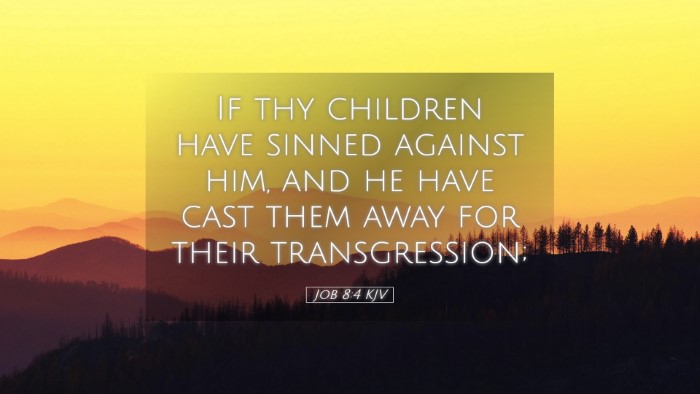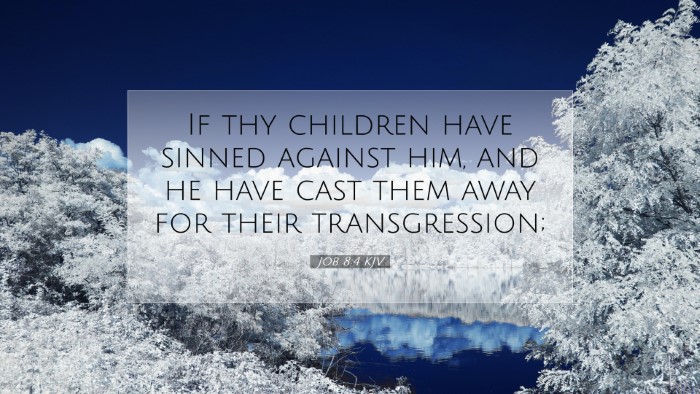Old Testament
Genesis Exodus Leviticus Numbers Deuteronomy Joshua Judges Ruth 1 Samuel 2 Samuel 1 Kings 2 Kings 1 Chronicles 2 Chronicles Ezra Nehemiah Esther Job Psalms Proverbs Ecclesiastes Song of Solomon Isaiah Jeremiah Lamentations Ezekiel Daniel Hosea Joel Amos Obadiah Jonah Micah Nahum Habakkuk Zephaniah Haggai Zechariah MalachiJob 8:4
Job 8:4 KJV
If thy children have sinned against him, and he have cast them away for their transgression;
Job 8:4 Bible Commentary
Commentary on Job 8:4
Job 8:4 states: "If your children have sinned against Him, He has cast them away for their transgression." This verse is spoken by Bildad the Shuhite, one of Job's friends, who responds to Job's lamentations in his time of suffering. The statement reflects the prevailing belief in the retributive justice of God, suggesting that suffering is directly correlated to sin.
Contextual Analysis
The book of Job presents a profound narrative around the themes of suffering, divine justice, and human righteousness. In contrasting faith and despair, Job grapples with the question of why the righteous suffer while the wicked flourish. Initially, Job's initial friends, including Bildad, represent traditional wisdom but soon fall into the trap of misapplying this wisdom to Job’s situation.
Insights from Public Domain Commentaries
Matthew Henry's Commentary
Henry emphasizes the erroneous theology of Bildad's assertion. He argues that Bildad's counsel is flawed because it suggests that God punishes every sin with immediate and specific consequences. Henry points out:
- Bildad implies a harsh view of God's justice, failing to recognize God's mercy and patience.
- He misunderstands the depth of Job’s integrity and assumes guilt without evidence.
- Henry invites readers to consider the broader and more nuanced nature of divine justice, emphasizing that God does discipline, but this is not always a simple equation of sin and punishment.
Albert Barnes' Commentary
Barnes provides a thorough linguistic and theological analysis of the verse. He notes that "if your children have sinned" suggests a hypothetical scenario rather than an accusation. Barnes asserts:
- Bildad’s logic is based on an assumption that went unchallenged in their cultural framework—the belief that misfortune is a direct result of personal wrongdoing.
- He also acknowledges the possibility of collective suffering of children due to hereditary sin.
- Barnes warns against presumption in attributing causes of suffering, advising readers to rely on the whole counsel of Scripture rather than finite interpretations.
Adam Clarke's Commentary
Clarke expands on the moral implications of Bildad’s statements, addressing the concept of divine justice and its manifestations. He articulates:
- Clarke stresses the need for a compassionate understanding of suffering, advocating for support and empathy rather than accusatory reflections on sin.
- He critiques Bildad for being too severe and reminds readers that children are not always punished for the sins of their parents.
- Clarke proposes that true wisdom recognizes the complexity of human suffering and the grace of God, which often transcends human understanding.
Theological Implications
The theological implications of Job 8:4 are significant for pastoral counsel and biblical scholarship. This verse invites a deeper examination of:
- The nature of God’s justice and how it is to be understood in the face of human suffering.
- The dangers of simplistic theological assertions in dealing with complex issues of pain, loss, and sin.
- The role of community in support versus condemnation, emphasizing the need for grace-filled responses to suffering.
Practical Applications
For pastors and leaders dealing with congregants who experience suffering, the insights derived from Job 8:4 through commentary analysis convey several important practical applications:
- Encourage open dialogue about suffering without attributing blame; provide a safe space for struggles with faith.
- Frame suffering in the context of a relational God who understands pain, rather than a distant deity who strictly enforces justice.
- Remind congregants that suffering is not always the result of specific sins, challenging them to reframe their understanding of God’s character.
Conclusion
In conclusion, Job 8:4 serves as a reminder of the intricate balance between divine justice and mercy. The commentaries from Henry, Barnes, and Clarke highlight the necessity of a careful approach to theological interpretations concerning suffering. By relying on a fuller understanding of Scriptural truths and communicating compassionately, pastors, students, and scholars can address the depths of human experience with the grace of God at the forefront.


